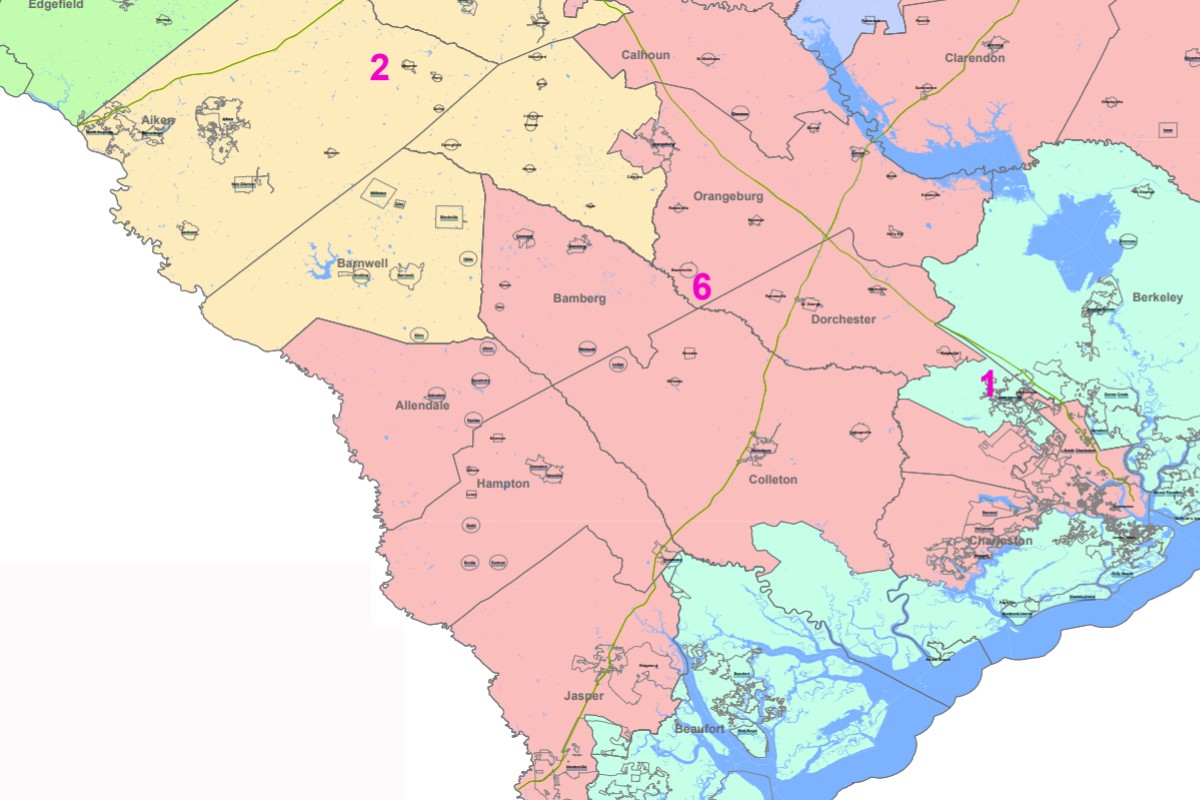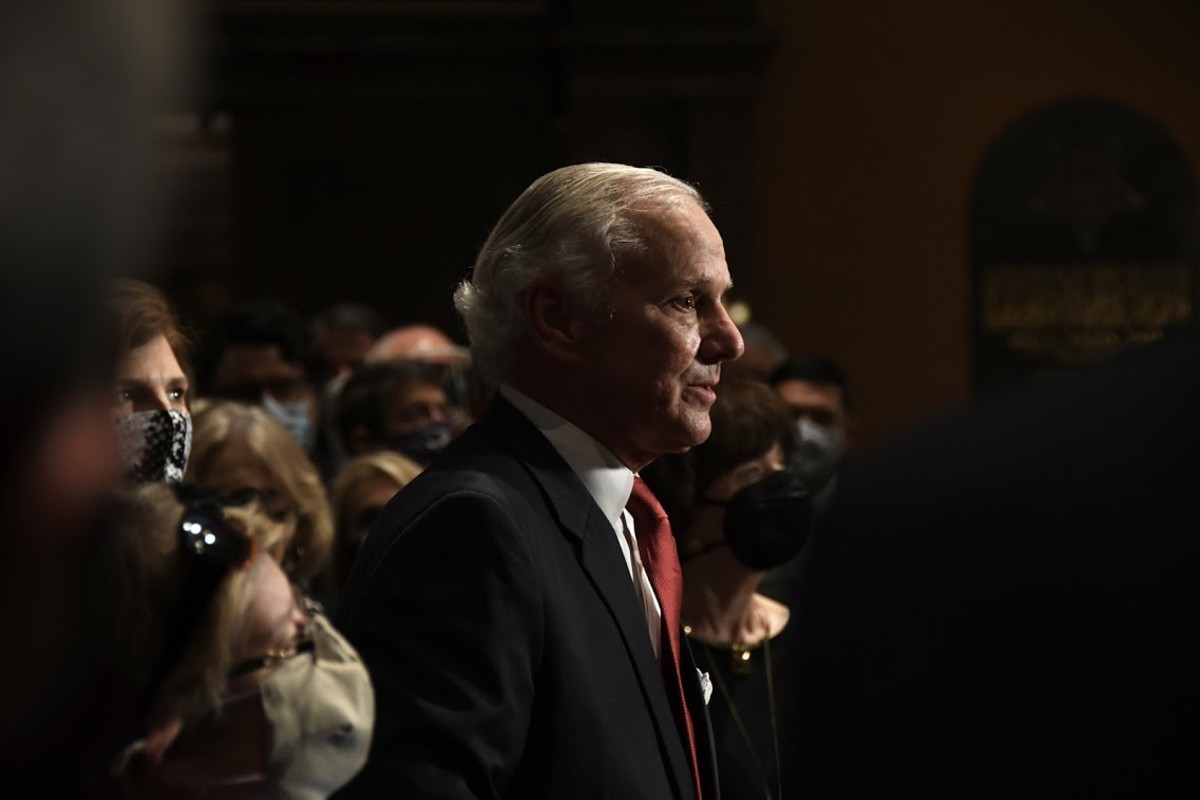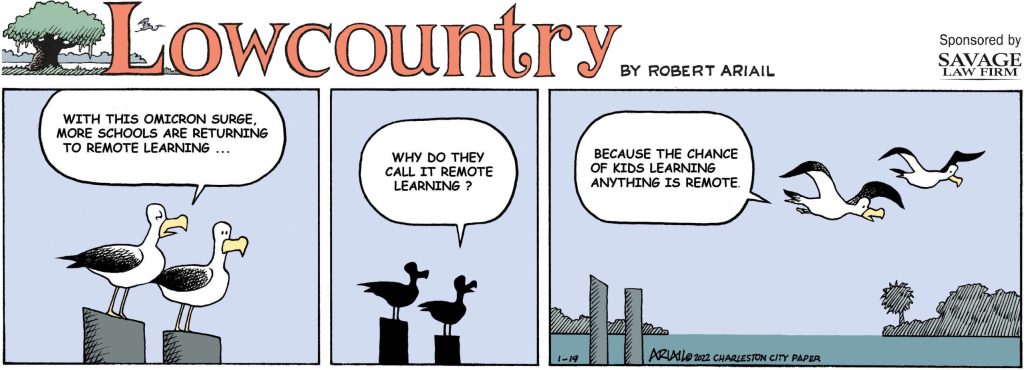STATEHOUSE REPORT | ISSUE 21.03 | JAN. 21, 2022
BIG STORY: Civil rights groups preparing legal action over new congressional map
NEWS BRIEFS: McMaster pushes tax cuts, education reform, mental health funding
LOWCOUNTRY, Ariail: Remote learning
COMMENTARY, Brack: Be careful about fiddling with income taxes
SPOTLIGHT: Palmetto Care Connections
MY TURN, Thomas: Science backs balanced teaching of reading, not phonics
FEEDBACK: School vouchers are mainly for white kids
MYSTERY PHOTO: Surrounded
 DONATE: We’re proud to offer Statehouse Report for free. For 20 years, we’ve been the go-to place for insightful independent policy and political news and views in the Palmetto State. And we love it as much as you do. But now, we can use your help. If you’ve been thinking of contributing to Statehouse Report over the years, now would be a great time to contribute as we deal with challenges thanks to the pandemic. In advance, thank you.
DONATE: We’re proud to offer Statehouse Report for free. For 20 years, we’ve been the go-to place for insightful independent policy and political news and views in the Palmetto State. And we love it as much as you do. But now, we can use your help. If you’ve been thinking of contributing to Statehouse Report over the years, now would be a great time to contribute as we deal with challenges thanks to the pandemic. In advance, thank you.
Groups preparing legal action over new congressional map

By Skyler Baldwin | The S.C. Senate on Thursday approved a new map for congressional districts that some advocacy groups and political leaders call “blatant gerrymandering,” leading many to predict federal legal challenges when districts become law.
Over the last few months, leaders in the General Assembly have reshaped S.C. House, Senate and congressional districts by drawing new lines to account for population shifts in the 2020 census. This reapportionment of district lines is required by the U.S. Constitution every 10 years after the census. How the lines are drawn has a huge impact on how the state is represented in Congress. On Thursday, senators approved a plan that would heavily favor Republicans in six of seven congressional districts, despite a Democratic proposal to have four GOP-leaning districts, one Democratic-leaning district and two competitive seats.

“This is a method of election that’s nothing new,” former congressman and current S.C. gubernatorial candidate Joe Cunningham said at a Jan. 17 press conference. “It’s called gerrymandering. Incumbent lawmakers get to draw their own district lines to their own advantage, making it virtually impossible for them to lose their elections and ensuring one-party rule.”
Senate Republicans point to similarities between the new map and current district lines as a strength of the proposal. S.C. Sen. Chip Campsen, R-Charleston, on Thursday said the proposal with the least amount of change adheres to traditional redistricting principles by retaining constituent consistency and preserving the cores of congressional districts.
Charleston, which currently is in the First Congressional District, has grown more competitive in recent years, having elected Cunningham, a Democrat, in 2018, and Nancy Mace, a Republican, in 2020. But with the new map, Charleston would be removed from the First District and placed in the Sixth District, a majority-minority district currently held by U.S. Rep. Jim Clyburn. The shift would make the First District more favorable to Mace and the GOP.
About 54 percent of voters in the newly proposed First District voted for Republican Donald Trump for president in 2020, about 2 percentage points higher than the district’s current makeup, according to a report from Associated Press.
The American Civil Liberties Union (ACLU) of South Carolina previously sued the state in December, citing the state’s “delayed redistricting process, which largely avoided public input and left electoral districts wildly out of proportion just months before election season” in a Tweet posted Dec. 24.
Now that the congressional map has been approved by the Senate, it is one step closer to seeing legal action.
 “The ACLU and the NAACP [National Association for the Advancement of Colored People] are already in court over redistricting on issues of transparency and the [S.C.]House map, which is terrible,” said Lynn Teague, a vice president with the League of Women Voters of South Carolina. “All they have to do is add the congressional map to the lawsuit once it’s decided on.”
“The ACLU and the NAACP [National Association for the Advancement of Colored People] are already in court over redistricting on issues of transparency and the [S.C.]House map, which is terrible,” said Lynn Teague, a vice president with the League of Women Voters of South Carolina. “All they have to do is add the congressional map to the lawsuit once it’s decided on.”
Teague said the League historically fights alongside other civil rights groups, but she said sitting out of the court battles frees the organization up for other kinds of activism.
“It’s a division of labor,” she said. “We are working very hard on the lobbying side, making sure the legislative record shows everything it needs to show to illustrate the problems — the gerrymandering — we’re working on public education and information, because once you’re in court, it limits what you can and can’t say or do.”
Representatives from the ACLU did not respond to requests for comment.
According to a FiveThirtyEight.com report on the redistricting process, the new map leaves the state with no competitive districts, a slight change from the previous iteration, which featured one slightly competitive district.
Cunningham warned at the press conference that the change would make it easier and more likely for sitting politicians to lean further into their political base and away from reasonable leadership.
“Without competitive districts, the politicians have no incentive to appeal to voters outside of their base,” he said. “They become more partisan and more extreme, and Congress becomes even more dysfunctional. That’s why we want to keep Charleston together … We aren’t asking you to draw a Democratic district. We’re here to ask you to draw a fair district.”
The Senate made minimal changes to the House-proposed congressional map, so the proposal now heads back to the House for final approval, but there may be another step in the process.

“I believe the congressional lines approved by the House and those approved by the Senate will most likely have to go to conference committee,” said S.C. House Speaker Pro Tempore Tommy Pope, R-York.
The committee would then hammer out the differences between the two maps and send it back to both chambers for final approval before sending it to the governor to sign.
- Skyler Baldwin is a reporter with the Charleston City Paper. Have a comment? Send to: feedback@statehousereport.com.
McMaster pushes tax cuts, education reform, more

Staff reports | Gov. Henry McMaster told legislators Wednesday the state’s booming economy, billions of extra state revenue and federal aid money will allow South Carolina to make bold steps toward transformation, especially when it comes to infrastructure.
In his fifth State of the State address (see full text), McMaster pushed for more investment in mental health, education spending reform and tax cuts. He also talked about pay raises for law enforcement officers and first responders as well as lowering student-to-teacher ratios in classrooms. In outlining his spending priorities, McMaster also took shots at Democratic President Joe Biden on vaccine mandates and Medicaid work requirements.
In the Democratic rebuttal, state Rep. Spencer Wetmore, D-Charleston, called on legislators to curb political extremism and focus more on bipartisanship (see full text).
“It’s time to stop focusing only on the next election and instead focus on getting things done for this state and for the people who live here,” said Wetmore, former administrator for Folly Beach.
In other recent news:
![]() Coronavirus cases keep breaking records. South Carolina’s COVID-19 numbers continue to climb as the state set another daily case record over the holiday weekend for the sixth time in less than three weeks. According to The State newspaper, “The state Department of Health and Environmental Control reported more than 20,000 new cases on Sunday, beating the record previously set on Friday. With the 68,597 cases added over the four long-weekend days pushed the weekly total to more than 113,300 cases, which also shattered the previous weekly record.” Click here for the most recent numbers.
Coronavirus cases keep breaking records. South Carolina’s COVID-19 numbers continue to climb as the state set another daily case record over the holiday weekend for the sixth time in less than three weeks. According to The State newspaper, “The state Department of Health and Environmental Control reported more than 20,000 new cases on Sunday, beating the record previously set on Friday. With the 68,597 cases added over the four long-weekend days pushed the weekly total to more than 113,300 cases, which also shattered the previous weekly record.” Click here for the most recent numbers.
State high court chief flip flops on lawyer-legislature order. S.C. Supreme Court Chief Justice Donald Beatty issued a ruling this month that rolled back a protection that barred lawyers who also serve as state legislators from being compelled to appear in court while the General Assembly is in session. The move earned him praise from prosecutors and victims’ advocates. But the next day, he quietly backtracked.
S.C. Senate to consider ban on drivers holding phones. A bill requiring anyone using a cellphone while driving to use hands-free features is heading for debate on the Senate floor, after the proposal passed a committee Wednesday.
Ex-provost Amiridis is new USC leader after long, tough search. The University of South Carolina on Friday named former professor and provost Michael Amiridis as its new president, turning toward a familiar person to end another problematic search for the school’s next leader.
Peeler in control of state spending in year with record funds. The senator newly holding South Carolina’s purse strings in a year the legislature has unprecedented amounts of cash is known by his colleagues as a frank-talking, hard-working leader who’s been preparing for the role for decades. This story also looked at Peeler’s new role.
North Charleston’s Scott releases memoir. Republican Sen. Tim Scott of South Carolina — one of only three Black senators — is one in a field of candidates seen as a potential foil to President Joe Biden in 2024. Now, he’s released a new memoir entitled, America. The release comes on the heels of his recent talks on the floor, challenging Democrats over voting rights and their rhetoric of a new “Jim Crow.” Scott also is releasing a video series on issues he sees as pertinent to the Black community. More: AP News
Former House member among candidates considered for judgeship. Former state Rep. Alan Clemmons is among the top three candidates eyeing an appointment for a Master-in-Equity judicial seat in Horry County.
- Want more headlines every business day that are like this? Visit our friends at SC Clips.
Remote learning

Cartoonist Robert Ariail always has an interesting take on what’s going on in South Carolina. Love the cartoon? Hate it? What do you think: feedback@statehousereport.com.
Be careful about fiddling with income taxes

By Andy Brack, editor and publisher | The monkeyshines about income taxes are on full display again at the Statehouse. But anti-tax advocates are playing with fire, selling a dangerous brew that could hurt regular people, increase risk and help wealthier people who already get pretty favorable tax treatment.
 Of the $10.9 billion in general tax revenue projected for 2022-23, just over half – $5.53 billion – comes from one source, individual income taxes. Combined with sales taxes, which generate about $3.7 billion, 84 percent of the state’s overall general fund revenues are based on these two state taxes.
Of the $10.9 billion in general tax revenue projected for 2022-23, just over half – $5.53 billion – comes from one source, individual income taxes. Combined with sales taxes, which generate about $3.7 billion, 84 percent of the state’s overall general fund revenues are based on these two state taxes.
Most tax-obsessed politicos ignore how South Carolinians have a comparatively low tax burden, ranking 42nd in the country, according to the Tax Foundation. Most ignore there are too many exemptions for sales and income taxes, costing billions in unrealized revenues to the state. Most ignore the tax bases are too narrow, which means lots of stuff just isn’t subject to taxes.
And because of the narrow tax bases for many state taxes, our rates are comparatively high. What Republicans in the Statehouse want to do is lower the rates without broadening the bases. If successful, that will mean the amount of money in always poor South Carolina would likely go down or stagnate, when billions are needed to catch up on education, health care and boosting opportunities for small businesses. (Republicans often argue that “growth” will make up for lowering tax rates, but what if they’re wrong and there’s another downturn? Then a bad situation gets worse.)
“Every time the state’s economy is healthy and growing, which is never a permanent state, the tax-haters are out with their knives ready to make permanent cuts in taxes,” said retired Clemson University economist Holley Ulbrich, who has researched and written about state and local tax policies for years. “And always income taxes, because those are the taxes paid by their favorite constituents, the ones who contribute to their campaigns and hang out in the same social circles.”
She said South Carolina ranked 40th in taxes as a percent of income. And in per capita revenue, the state is poor, ranked 48th among the 50 states. People don’t want to hear it, but look at the schools, roads, bridges and other infrastructure.
We are undertaxed and underserved relative to our peers,” Ulbrich said. “The income tax specifically takes 1.94 percent of personal income and yields $972 per capita. In Georgia, it is 2.37 percent of income and $1,108 per capita. In North Carolina, it is 2.78 percent or $1,215.
“You would think our very low income taxes would have given us a comparative advantage by now in attracting economic development compared to our two neighboring states, but not so.”

State Sen. Mike Fanning, D-Fairfield, believes the tax system needs to be fairer, but supports a drop of the top income bracket from 7 percent to 6 percent over five years, which the GOP has proposed.
“The goal should be to tax everybody and everyone but do it at the lowest rate possible,” he told Statehouse Report. But the smarter and fairer way to deal with taxes, he said, is to reform the whole taxing structure at one time, not make targeted cuts hither and yon.
For example, South Carolina loses more than $3 billion a year because it has about 100 special-interest exemptions for sales taxes. And state law provides the taxing of about three dozen types of services of the 175 that could be taxed. Example: You pay sales taxes on dry cleaning services, but not on legal services.
“We’ve got to start saying no to piecemeal tax policy,” Fanning said.
State lawmakers would do better to invest significant time in making comprehensive tax reform instead of risking unintended consequences from wantonly cutting income tax rates, our largest and most reliable revenue source.
Andy Brack, editor and publisher of Statehouse Report, also is publisher of the Charleston City Paper. Have a comment? Send to: feedback@statehousereport.com.
Palmetto Care Connections
 Statehouse Report is brought to you at no cost thanks to the generous support of underwriters, such as Palmetto Care Connections.
Statehouse Report is brought to you at no cost thanks to the generous support of underwriters, such as Palmetto Care Connections.
Established in 2010, Palmetto Care Connections (PCC) is a non-profit organization that brings technology, broadband and telehealth solutions to health care providers in rural and underserved areas in South Carolina. PCC hosts the Annual Telehealth Summit of South Carolina presenting state and national best practices and trends, as well as providing networking connections for health care, technology and broadband professionals.
The leader of the South Carolina broadband consortium, PCC assists health care providers in receiving broadband savings through the Federal Communication Commission’s Healthcare Connect Fund program. Since 2013, PCC has helped providers save more than $25 million in broadband costs.
PCC co-chairs the South Carolina Telehealth Alliance, along with the Medical University of South Carolina, serving as an advocate for rural providers and partnering with organizations to improve health care access and delivery for all South Carolinians.
- Learn more about Palmetto Care Connections.
Science backs balanced teaching of reading, not intensive phonics

By Paul L. Thomas | For about three years, states across the U.S., including South Carolina, have been adopting new reading legislation. This recent movement has been driven by a media fascination with the “science of reading.”

Proponents of the “science of reading” have made some dramatic claims: teachers are not teaching reading based on the current research base because teacher educators have failed to prepare those teachers, and students are struggling to read because of those failures.
The “science of reading” movement has also taken aim at popular reading programs—notably those by Lucy Calkins and Fountas and Pinnell—arguing that they lack the support of research.
As a result, we are now in the midst of yet another Reading War, pitting systematic intensive phonics (supported by the “science of reading” advocates) against balanced literacy (which has its roots in the whole language movement).
While public education certainly has an obligation to focus on literacy for all students, especially students living in poverty as well as those struggling to read, the “science of reading” movement is causing far more harm than good.
Reading wars and debates over the proper place of systematic intensive phonics happen in English-speaking countries all over the world, including England where a shift to systematic intensive phonics occurred almost two decades ago. Dominic Wyse and Alice Bradbury detail the transition:
“Prior to 2006, the teaching of reading in most classrooms in England is best described as balanced instruction, in which some phonics teaching has always been part of the teaching of reading typically for children in the infant years (aged five to seven) although not necessarily ‘systematic phonics’ instruction…. However in 2006, the Rose Report recommended that there should be even more emphasis on phonics teaching….
“This was followed by the increased emphasis on discrete teaching of phonics recommended by the Rose Report and the PNS from 2006 onwards. Further intensification of synthetic phonics teaching was seen in England’s national curriculum of 2014, along with a range of other measures to ensure teacher compliance with the prescribed method of teaching reading, including the use of the PSC [phonics screen testing]; the vetting of phonics teaching schemes; and the use of the inspectorate to focus on outcomes in statutory reading assessments as a prime focus in school inspections.”
In other words, England shifted away from balanced literacy and toward systematic intensive phonics—the goal of the “science of reading” movement—about 16 years ago.
Therefore, Wyse and Bradbury’s analysis of this shift is a powerful message for the current call to drop balanced literacy for systematic intensive phonics (what advocates call the “science of reading”).
Wyse and Bradbury use a meta-synthesis of experimental research (the “science of reading”) and a survey of 2,205 teachers to draw the following conclusions: “Our findings from analysis of tertiary reviews, systematic reviews … do not support a synthetic phonics orientation to the teaching of reading: they suggest that a balanced instruction approach is most likely to be successful.”
The “science of reading,” in fact, supports balanced literacy and not prioritizing systematic intensive phonics.
Further, Wyse and Bradbury offer important recommendations:
“In addition to the importance of contextualized reading teaching as an evidence-based orientation to the teaching of reading, we hypothesize the following pedagogical features that are likely to be effective. Phonics teaching is most likely to be effective for children aged five to six. Phonics teaching with children younger than this is not likely to be effective. A focus on whole texts and reading for meaning, to contextualize the teaching of other skills and knowledge, should drive pedagogy. Classroom teachers using their professional judgment to ensure coherence of the approach to teaching phonics and reading with other relevant teaching in their classroom is most likely to be effective. Insistence on particular schemes/ basals, scripted lessons and other inflexible approaches is unlikely to be optimal. Well-trained classroom assistants, working in collaboration with their class teachers, could be a very important contribution to children’s reading development.”
Another key problem with the “science of reading” movement is state’s adopting prescriptive phonics programs, a move doomed to failure as this study confirms.
Although too many states have jumped on the “science of reading” bandwagon already, this important research from England is an opportunity to pause, readjust and not waste another decade or two making the same mistake England made in 2006.
Dr. Paul L. Thomas is a professor of education at Furman University. Have a comment? Send to feedback@statehousereport.com.
School vouchers are mainly for white kids
To the editor:
![]() Never mind voucher schools are “Open to all” and race-neutral. Blow up inferior instruction with capitalism. Competition will fix this one. The current economic-based land zoning policies largely shape the educational zoning patterns. Sorting children into the local school system reflects the community’s race distribution.
Never mind voucher schools are “Open to all” and race-neutral. Blow up inferior instruction with capitalism. Competition will fix this one. The current economic-based land zoning policies largely shape the educational zoning patterns. Sorting children into the local school system reflects the community’s race distribution.
Our community’s children begin to have greater contact in the middle and upper grades where more than 3Rs get learned. That exposure is a problem for us for many reasons including the disparities.
Vouchers are a policy contrivance promoted as a way to achieve the education performance we all seek. Higher levels of educational performance can occur with vouchers as well as can no growth or poor performance. Screen in a bunch of high-performing white kids into a school, eliminate the harmed black kids, calculate some comparative averages. Incorrectly infer vouchers are the answer to the poor performance. (This is selection creaming).
Vouchers will also keep the continued racial clustering (white or black) as the intent or the consequence.
– Fred Palm, Edisto Island, S.C.
Send us your thoughts
We receive a few comments a week and look forward to publishing. But often we can’t because we can’t verify the identity of the writer. To be published, you’ve got to provide us with contact information so we can verify your letters. Verified letters to the editor are published weekly. We reserve the right to edit for length and clarity. Comments are limited to 250 words or less. Please include your name and contact information.
- Send your letters or comments to: feedback@statehousereport.com
Surrounded

Here’s a curious structure surrounded by vines and other vegetation. Any idea where it is? (Hint: Somewhere in South Carolina’s Lowcountry.) Send your guess to feedback@statehousereport.com — and remember to include your name, home city and contact information.
 Last week’s mystery, “Empty bridge,” shows the so-called “Bridge to Nowhere” in the Charleston Neck area between Charleston and North Charleston.
Last week’s mystery, “Empty bridge,” shows the so-called “Bridge to Nowhere” in the Charleston Neck area between Charleston and North Charleston.
George Graf of Palmyra, Va., explained: “On the other side of the bridge sits 182 acres of unused, valuable, privately owned land called the Magnolia property. It’s on the peninsula, adjacent to the Ashley River and convenient to I-26. For years, the area housed fertilizer plants and lumber treatment facilities. During that time, harmful chemicals made their way into the groundwater and soil and would have to be cleaned up. In 2003, the City of Charleston, along with the private developers who owned the land, dreamed up a plan to redevelop the Magnolia property into a glorious, mixed-use development.
“In 2008, construction began on the $10 million bridge but while the bridge was being erected, the economy promptly collapsed. In 2010, … the property went into bankruptcy. The project stalled. But the bridge remained.”
Today, the project is getting a breath of new life as developers are planning infrastructure construction in the spring.
Congratulations to Graf and others who identified the photo: Allan Peel of San Antonio, Texas; Wayne Beam of Clemson; Pat Keadle of Wagener; Frank Bouknight of Summerville; Elizabeth Jones of Columbia; and David Lupo of Mount Pleasant.
Send us a mystery. If you have a photo that you believe will stump readers, send it along (but make sure to tell us what it is because it may stump us too!) Send to: feedback@statehousereport.com and mark it as a photo submission. Thanks.
ORDER NOW: Copies are in Lowcountry-area bookstores now, but if you can’t swing by, you can order a copy online today.
ABOUT STATEHOUSE REPORT
Statehouse Report, founded in 2001 as a weekly legislative forecast that informs readers about what is going to happen in South Carolina politics and policy, is provided to you at no charge every Friday.
- Editor and publisher: Andy Brack, 843.670.3996
Donate today
We’re proud to offer Statehouse Report for free. For more than a dozen years, we’ve been the go-to place for insightful independent policy and political news and views in the Palmetto State. And we love it as much as you do.
But now, we can use your help. If you’ve been thinking of contributing to Statehouse Report over the years, now would be a great time to contribute as we deal with the crisis. In advance, thank you.
Buy the book
Now you can get a copy of editor and publisher Andy Brack’s We Can Do Better, South Carolina! ($14.99) as a paperback or as a Kindle book ($7.99). . The book of essays offers incisive commentaries by editor and publisher Andy Brack on the American South, the common good, vexing problems for the Palmetto State and interesting South Carolina leaders.
More
- Mailing address: Send inquiries by mail to: P.O. Box 21942, Charleston, SC 29413
- Subscriptions are free: Click to subscribe.
- We hope you’ll keep receiving the great news and information from Statehouse Report, but if you need to unsubscribe, go to the bottom of the weekly email issue and follow the instructions.
- Read our sister publication: Charleston City Paper (every Wednesday in print; Every day online)
- © 2021, Statehouse Report, a publication of City Paper Publishing, LLC. All rights reserved.


